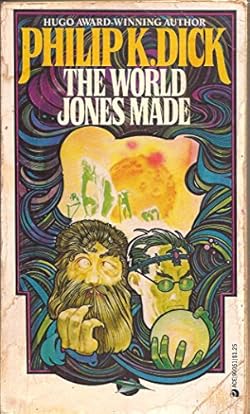
![]() The World Jones Made by Philip K. Dick
The World Jones Made by Philip K. Dick
By 1956, the sensation of seeing his name in print was not a new one for author Philip K. Dick. Between 1952 and 1955, he had placed around 75 (!) short stories in the various science fiction magazines and digests of the day, and in 1955 his first novel, Solar Lottery, saw its first publication. That novel appeared in one of those cute little “Ace doubles” (D-103, for all you collectors out there), backed with Leigh Brackett’s The Big Jump. The book sold passably well, Dick later wrote; around 150,000 copies’ worth. (Today, that 35-cent paperback is likely to fetch 70 times its original price.)
Dick’s follow-up novel came the next year, and that novel, The World Jones Made, also initially appeared as an Ace double (D-150), paired with Margaret St. Clair’s Agent of the Unknown. Dick’s second full-length work finds the future Hugo winner already displaying many of the strengths and obsessions that would become the hallmarks of his glorious writing career. His compassion for “the little guy,” his finely drawn characters, his knack for well-written dialogue, and his concerns with alien life-forms, “precogs” and duplicitous governments are all evident in this early work. As compared to some of his later books, this is a very accessible, “reader-friendly” novel; no mind-twisting abnegations of reality in this one. Still, the book is chock-full of ideas, perhaps too much so for its brief length; Dick couldn’t write an empty-headed book if he tried.
 The World Jones Made consists of several plot threads that are woven very nicely together. In one, eight laboratory-made mutants come to realize that their ultimate destiny may be one on another planet… specifically, Venus. In another, giant, space-born(e) amoebas called “drifters” cause a minor panic when they start descending on Earth. And in a third, Floyd Jones, a “precog” with the ability to see precisely one year into the future, rises from carnival freak show attraction, to reverend, to the man who causes the collapse of Fedgov and assumes command of the nation. These events are seen through the eyes of Doug Cussick, a Fedgov security agent, and his wife, Nina, who becomes sympathetic to the Jones cause.
The World Jones Made consists of several plot threads that are woven very nicely together. In one, eight laboratory-made mutants come to realize that their ultimate destiny may be one on another planet… specifically, Venus. In another, giant, space-born(e) amoebas called “drifters” cause a minor panic when they start descending on Earth. And in a third, Floyd Jones, a “precog” with the ability to see precisely one year into the future, rises from carnival freak show attraction, to reverend, to the man who causes the collapse of Fedgov and assumes command of the nation. These events are seen through the eyes of Doug Cussick, a Fedgov security agent, and his wife, Nina, who becomes sympathetic to the Jones cause.
Into this mix Dick throws such disparate ingredients as a hermaphrodite sex show, robot babysitters, a robot opera, egg-laying parasitic worms and other alien life-forms, a “lethe mirror” that wipes the mind clean of all memories, some interesting speculations on the future of divorce and child custody arrangements (the bulk of the novel transpires in the post-apocalyptic year of 2002), and a San Francisco bar in which pot and heroin are casually ordered by the customers! We also get a look at what it is like to be a precog with the ability to see one year into the future; Jones, thus, experiences his birth trauma nine months before it actually occurs, and in essence must live through all the events in his life… twice.
The World Jones Made is compulsively readable, fast moving and concise; indeed, this reader was left wishing that it could have been 50 pages or so longer, or that Dick might have written a sequel to it someday. (Dick was one of the few science fiction authors who largely refrained from churning out sequels.) A more in-depth examination of the Jones character would certainly have been nice, and some of the personages in the book (such as Tyler Fleming, a remarkably capable, 17-year-old Fedgov employee) just kind of peter out.
The World Jones Made, though over 50 years old, has not dated a bit, except perhaps in a passing reference to Leopoldville (now the Zairean capital of Kinshasa) and the fact that… well, Earth was NOT convulsed by an atomic war that ended in 1994. (Lucky us!) The World Jones Made, then, is a fun and entertaining read by a compelling, then relatively new voice in science fiction. It is not anything great, mind-warping or classic. For Philip K. Dick, those would come later…



COMMENT Was I hinting that? I wasn't aware of it. But now that you mention it.... 🤔
So it sounds like you're hinting Fox may have had three or so different incomplete stories that he stitched together,…
It's hardly a private conversation, Becky. You're welcome to add your 2 cents anytime!
If the state of the arts puzzles you, and you wonder why so many novels are "retellings" and formulaic rework,…
I picked my copy up last week and I can't wait to finish my current book and get started! I…